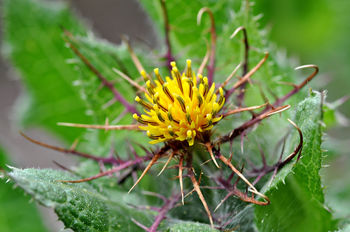Blessed Thistle
Other Names: Blessed Thistle, Carbenia Benedicta, Cardo Bendito, Cardo Santo, Carduus, Carduus Benedictus, Chardon Béni, Chardon Bénit, Chardon Marbré, Cnici Benedicti Herba, Cnicus, Cnicus benedictus, Holy Thistle, Safran Sauvage, Spotted Thistle, St. Benedict Thistle.
Blessed thistle is a plant. People use the flowering tops, leaves, and upper stems to make medicine. Blessed thistle was commonly used during the Middle Ages to treat the bubonic plague and as a tonic for monks.
See also :
Special Precautions of Blessed Thistle
- Don’t confuse blessed thistle with Milk Thistle (Silybum marianum).
- In high doses, such as more than 5 grams per cup of tea, blessed thistle can cause stomach irritation and vomiting.
- Pregnancy and breast-feeding: Don’t take blessed thistle by mouth if you are pregnant. There is some evidence that it might not be safe during pregnancy. It’s also best to avoid blessed thistle if you are breast-feeding. Not enough is known about the safety of this product.
- Intestinal problems, such as infections, Crohn's disease, and other inflammatory conditions: Don’t take blessed thistle if you have any of these conditions. It might irritate the stomach and intestines.
- Allergy to ragweed and related plants: Blessed thistle may cause an allergic reaction in people who are sensitive to the Asteraceae/Compositae family. Members of this family include ragweed, chrysanthemums, marigolds, daisies, and many others. If you have allergies, be sure to check with your healthcare provider before taking blessed thistle.
- Antacids interacts with BLESSED THISTLE
- Medications that decrease stomach acid interacts with BLESSED THISTLE
Benefits and uses of Blessed Thistle are
Blessed thistle contains tannins which might help diarrhea, coughs, and inflammation. However, there isn't enough information to know how well blessed thistle might work for many of its uses. Blessed thistle is typically touted as a natural remedy for the following health problems:
- bacterial infections
- colds
- cough
- diarrhea
- fever
- indigestion
- inflammation
- loss of appetite
- Promoting milk flow in breast-feeding mothers.
- Promoting urine flow
